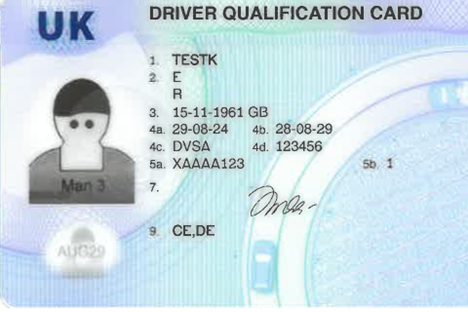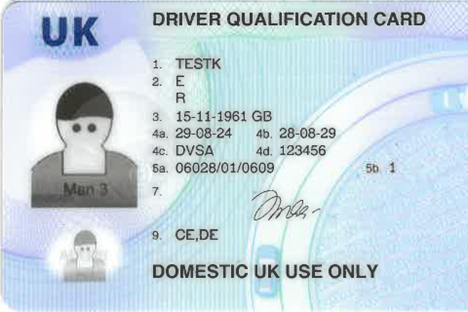Changes to the Driver Certificate of Professional Competence (CPC), agreed by Parliament in October, will take effect from December 3.
The aim is to increase flexibility, with the minimum length of a training course being cut from seven hours to three-and-a-half hours.
From December 3, drivers will be able to choose to stay qualified by taking either the International Driver CPC or the National Driver CPC.
International Driver CPC is the new name for how Driver CPC previously worked.
Drivers will need to take 35 hours of International Driver CPC training every 5 years to be allowed to drive in the EU and the UK.
The are no changes to how it works. This means that courses drivers take must be at least 7 hours long and if a course is split over a day, it must be completed on two consecutive days.
Drivers are also allowed to do a total of 12 hours e-learning towards their overall 35 hours of training
The National Driver CPC is a more flexible version of the previous Driver CPC.
If a driver only wants to drive in the UK, they will be able to take either 35 hours of National Driver CPC training every 5 years or a combination of 35 hours of National Driver CPC and International Driver CPC training every 5 years.
National Driver CPC courses have been cut from seven hours to three-and-a-half hours and, as previously recommended, e-learning modules will be decoupled from trainer-led courses.
Drivers will still be required to have their Driver CPC card (driver qualification card - DQC) with them at all times.
However, from December 3, depending on which option a driver chooses to stay qualified with, they will get a different Driver CPC card.
Driver CPC card for International Driver CPC

Driver CPC card for National Driver CPC

This card will look similar to the current Driver CPC card but will include the text ‘Domestic UK use only’.
John Keelan Edwards, MD of Driver Hire Training, said: “These changes mean that within the 35 hours of required Driver CPC training every 5 years, drivers opting for the new National Driver CPC will be able to take courses in smaller 3.5 hour chunks and do up to 12 hours of the training online.
“This is good news for the industry as the new option will be a more accessible and flexible qualification, especially regarding e-learning.
“It will allow the industry to remain efficient and safe as well as make it easier for current drivers to renew training.”
Keelan also argues that the training is good for fleets, as they can ensure their drivers receive their training, but can also still meet the needs of their customers.
“The logistics industry is the backbone of the economy, and we are pleased that the new Government is rolling out the changes this year, showing a level of commitment to the logistics sector, improving this key qualification to encourage new and established drivers alike,” he added.
“The changes are just four weeks away, which means training companies need to act now to get ready to roll out the new training modules.
“We know from driver feedback that the new type of course will be welcomed by drivers in their busy professional lives, as it allows them to be more flexible in doing their mandatory training, so we are assured drivers are going to welcome the change in December.
“The ‘return to work’ option has yet to have an announcement date, so we will continue to monitor and work closely with the relevant authorities on any future changes. We believe it is important that we do all that we can to help people get back into driving, supporting the UK’s logistics needs.”
The Driver CPC, which was introduced in 2007, is a qualification that professional drivers of certain goods or passenger carrying vehicles are required to hold in addition to their driving licence.
In the UK, except in the case where a driver had ‘acquired rights’, it is initially obtained by completing four test modules consisting of a two-part theory test, case studies, a practical driving test and a practical demonstration of vehicle operation.
It is then renewed by completing 35 hours of periodic training every five years. Completing 35 hours of training allows a driver to drive for commercial purposes for five years.
The main objectives of Driver CPC, when introduced, were to improve road safety and the safety of the driver, including during operations carried out by the driver while the vehicle is stopped and to raise the professional recognition of drivers, thereby attracting greater interest in the profession and increasing the number of drivers.
As a result of the acute driver shortages in 2021, the Government announced a policy review into the Driver CPC in November 2021.
The review sought to assess how the qualification could be reformed to reduce the burden on drivers and ensure it did not act as a barrier to working in the sector.
The outcome of this review, published in March 2023, proposed ways in which the qualification could be reformed, which were put to public consultation.
Chris Yarsley, senior policy manager for road freight regulation at Logistics UK, says that the revisions to the Driver CPC ensure road safety is maintained while introducing much-needed flexibility into the training regime that will help retain drivers and ease the process for those returning to the industry.
He added: “Our members have never questioned the need for the Driver CPC regime and welcome the reputation which attaining the current standard bestows on their businesses and their drivers.”





















Login to comment
Comments
No comments have been made yet.